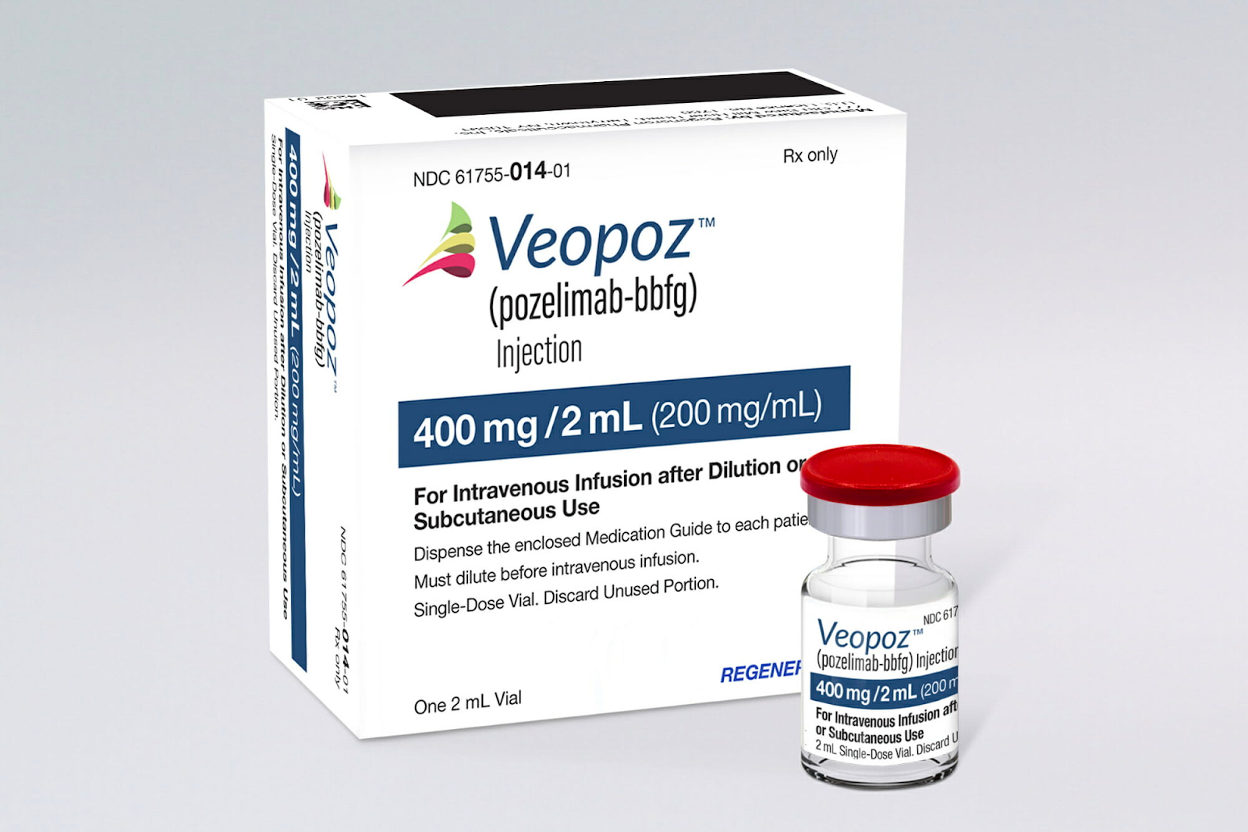Veopoz: The First FDA-approved Treatment for CHAPLE Disease

The U.S. Food and Drug Administration (FDA) has announced its approval for the innovative drug, Veopoz (pozelimab-bbfg) [1,2], making it the inaugural approved remedy for CHAPLE disease, which affects both adults and children over one year of age.
What is CHAPLE Disease?
CHAPLE [3], an acronym for complement hyperactivation, angiopathic thrombosis, and protein-losing enteropathy, is a rare, inherited immune disorder. It’s characterized by an overactive complement system – our body's defense mechanism against harm and foreign invaders. This hyperactivity is instigated by mutations in the CD55 gene, causing the system to turn against the body's own cells.
Globally, under 100 cases have been documented. Afflicted individuals often experience symptoms like abdominal pain, weight loss, nausea, vomiting, and edema. The disease also carries the risk of severe blood vessel blockages, which can be fatal.
The Efficacy of Veopoz
A single-arm study, coded as NCT04209634, gauged Veopoz's effectiveness [4]. The patients' conditions before and after treatment were critically assessed, focusing on those with active CD55-deficient PLE (hypoalbuminemia being the defining marker). Other symptoms, such as abdominal pain and edema, were also considered.
A 30 mg/kg Veopoz dosage was given to the patients intravenously, succeeded by weekly subcutaneous injections, calibrated on body weight. All ten participants, aged between 3 to 19, displayed an elevated serum albumin concentration by the 12th week, maintaining it for up to 72 weeks. Hospitalizations and albumin transfusions were also notably reduced during the 48 weeks following the treatment. Ultimately, the Veopoz was found to be safe and effective [5].
Safety Protocols and Concerns
Patients should be well-informed about Veopoz's possible side effects, including respiratory infections, hives, fractures, and alopecia. Critically, there's a Boxed Warning regarding grave meningococcal infections, which can be fatal if not timely identified and managed. To mitigate the risk, a meningococcal vaccination should be administered at least two weeks prior to the Veopoz treatment. Additional vaccination against bacterial infections like Streptococcus pneumoniae and Haemophilus influenzae type b (Hib) is also recommended. It is important to note many drugs in this classification such as Soliris and Ultomiris also have similar Boxed Warnings.
Full prescribing and labeling information can be found here [6].
Accelerated Approval for Veopoz
Recognizing its potential in addressing a severe medical condition, the FDA expedited Veopoz’s review by granting it fast track, orphan drug, and rare pediatric disease designations.
In conclusion, Veopoz is a monumental stride in the quest to provide relief to those suffering from CHAPLE disease, but it's crucial for patients and caregivers to remain informed about its usage and potential risks.
Why Cater to Such a Small Population? Follow the Money.
Producing a treatment for CHAPLE disease, affecting fewer than 100 globally, might seem like a misaligned business strategy, but scratching beneath the surface, producing “orphan drugs” for rare diseases can be surprisingly lucrative (owing to lack of competition and assuming a well-designed commercial launch).
But there's more. The mechanism of action of Veopoz, as a complement inhibitor, mirrors drugs like eculizumab which have found off-label utility across various diseases. Given this, Veopoz might be eyeing a broader horizon. Diseases where the immune system's complement pathway goes awry could be potential targets. Think beyond CHAPLE: could Veopoz make headway into other conditions where eculizumab is used, or even broader autoimmune disorders?
In essence, Veopoz's foray into treating CHAPLE could be just the tip of the iceberg, a calculated move to penetrate a wider, lucrative market.
References:
[3]: https://en.wikipedia.org/wiki/CD55_deficiency
[5]: https://papers.ssrn.com/sol3/papers.cfm?abstract_id=4485593
[6]: https://www.accessdata.fda.gov/drugsatfda_docs/label/2023/761339s000lbl.pdf
